
By now, you probably don’t need anyone telling you smoking cigarettes is bad for your health. With the U.S. implementing “no smoking” laws, running mass media campaigns designed to educate people on the dangers of cigarettes, and increasing access to quitting helplines and solutions, the number of adults who still smoke regularly has declined dramatically in recent years. But it hasn’t stopped everyone, and there’s more than just smoking combustible cigarettes. In fact, many people now have relatively easy accessibility to marijuana as mainstream acceptance (and laws) surrounding it continues to evolve. Have you ever wondered about smoking on more than just your health? We surveyed over 1,000 people—smokers and nonsmokers alike—about their perceptions of smoking around the house, whether involving combustible cigarettes, vaporizers, cigars, or marijuana. Keep reading to see what we learned.
How dangerous does it seem?
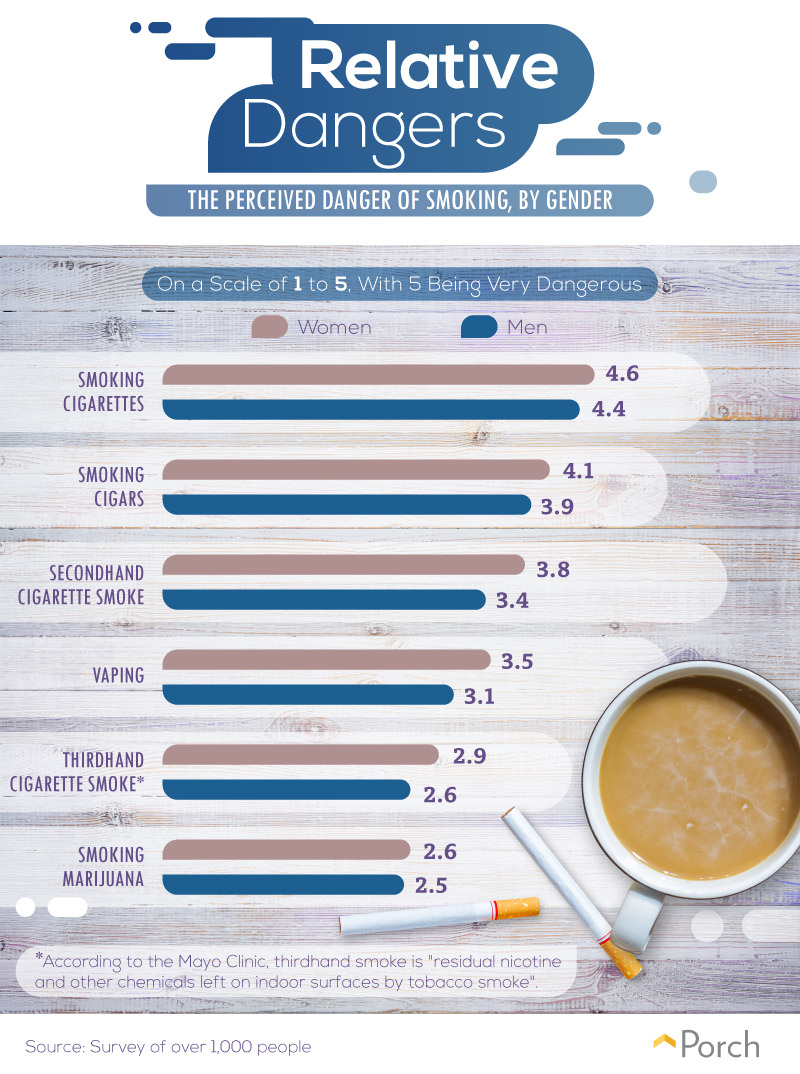 When asked how well they understood the dangers of smoking to their health, both men and women rated cigarettes as the most dangerous form with ratings of 4.4 and 4.6, respectively. Most people perceived other exposures to smoking, like cigars and secondhand smoke, as less dangerous, though. All tobacco smoke (including secondhand smoke), however, contains dangerous chemicals that have been linked to cancer and lung and heart conditions, as well as other oral and dental diseases. The average person might underestimate the dangers of thirdhand smoke as well. Thirdhand smoke equates to the residual effects of smoking on a physical surface (like your walls or clothing) and can contain the same chemicals found in cigarettes and secondhand smoke. Because of the severity of these chemicals, both children and adults are at risk when they come into contact with this residue. Still, not everyone may realize just how dangerous that exposure really is. Women rated thirdhand smoke a 2.9 out of five, while men ranked it just a 2.6. Only smoking marijuana was seen as less dangerous overall.
When asked how well they understood the dangers of smoking to their health, both men and women rated cigarettes as the most dangerous form with ratings of 4.4 and 4.6, respectively. Most people perceived other exposures to smoking, like cigars and secondhand smoke, as less dangerous, though. All tobacco smoke (including secondhand smoke), however, contains dangerous chemicals that have been linked to cancer and lung and heart conditions, as well as other oral and dental diseases. The average person might underestimate the dangers of thirdhand smoke as well. Thirdhand smoke equates to the residual effects of smoking on a physical surface (like your walls or clothing) and can contain the same chemicals found in cigarettes and secondhand smoke. Because of the severity of these chemicals, both children and adults are at risk when they come into contact with this residue. Still, not everyone may realize just how dangerous that exposure really is. Women rated thirdhand smoke a 2.9 out of five, while men ranked it just a 2.6. Only smoking marijuana was seen as less dangerous overall.
Smoking inside
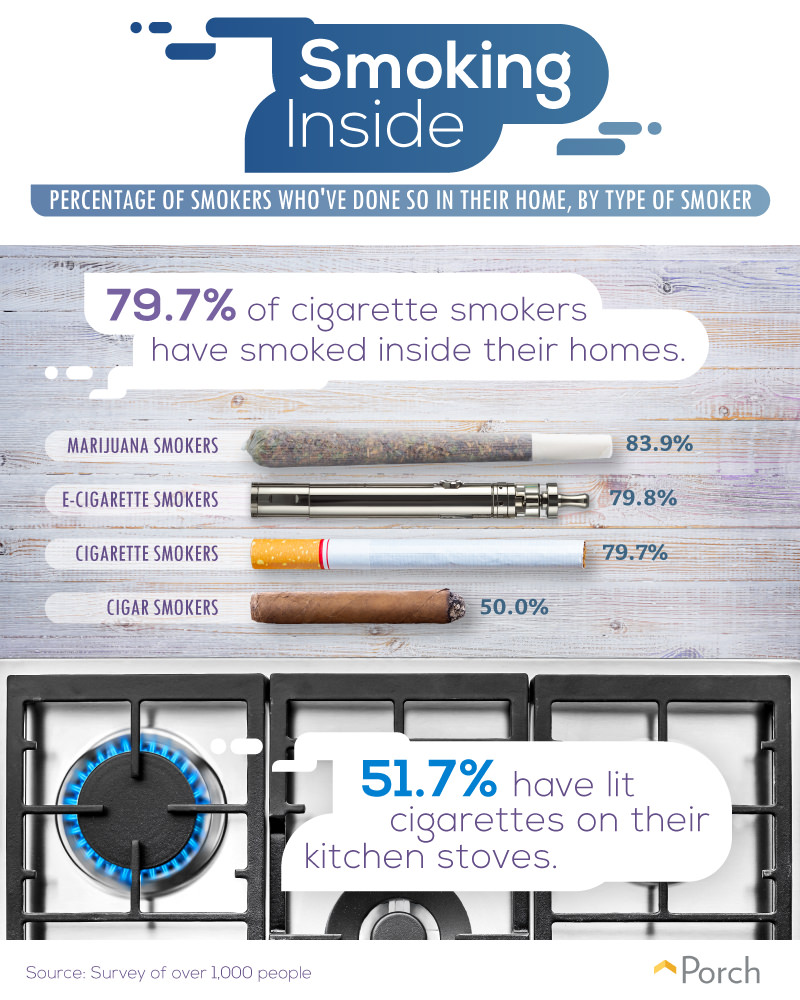 Despite the dangers of thirdhand smoke, the lingering odor, and even the potential for wall and furniture discoloration, nearly 80 percent of cigarette smokers admitted to smoking inside their homes. Studies have shown the chemical traces from tobacco can last on physical surfaces for up to five years. For those smoking cigarettes, cigars, or even vaporizers, the impact of even occasionally smoking inside can negatively affect the health of friends, family, and pets.
Despite the dangers of thirdhand smoke, the lingering odor, and even the potential for wall and furniture discoloration, nearly 80 percent of cigarette smokers admitted to smoking inside their homes. Studies have shown the chemical traces from tobacco can last on physical surfaces for up to five years. For those smoking cigarettes, cigars, or even vaporizers, the impact of even occasionally smoking inside can negatively affect the health of friends, family, and pets.
Can I light up in here?
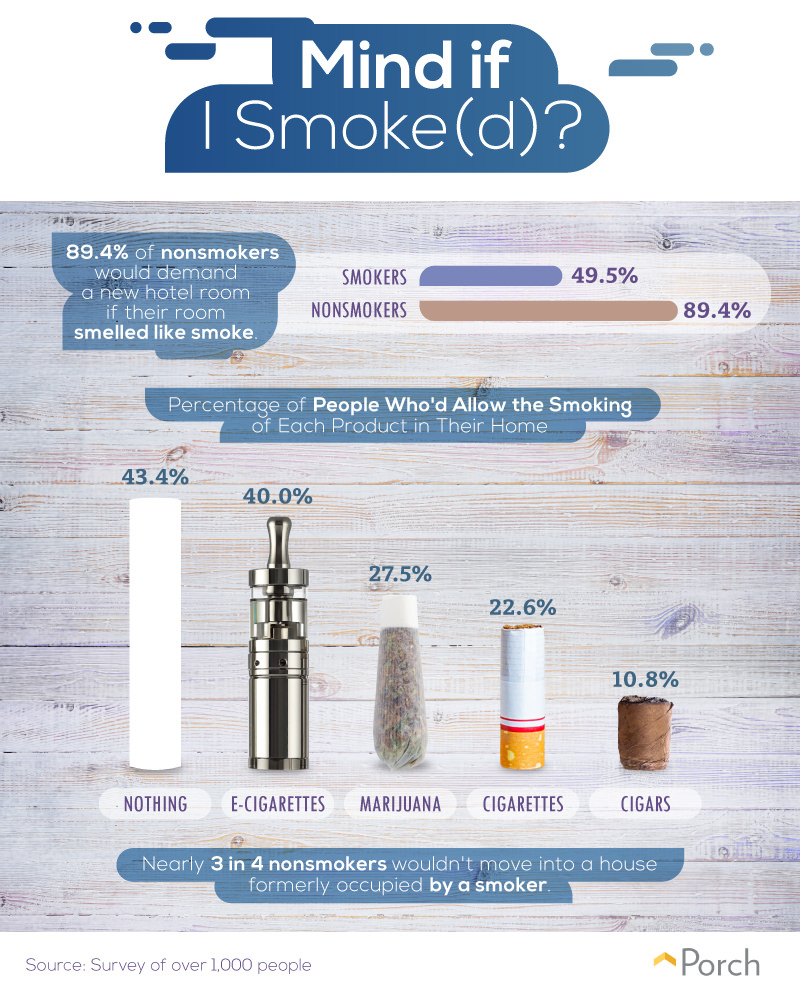 Whether it’s the fear of getting sick or a smell that just won’t go away, nearly 3 in 4 nonsmokers would be unwilling to buy a house formerly occupied by a smoker. This opinion doesn’t just apply to buying a new home, either. A rising trend of apartments not allowing smoking anywhere is starting to take hold, and nearly 90 percent of nonsmokers would request a different hotel room if they thought their lodgings smelled like cigarette smoke. Considering how long thirdhand smoke can linger on your surfaces and furniture, you might want to reconsider letting a house guest light up inside your home, as well. Roughly 43 percent of people wouldn’t let their guests smoke anything at all, while 40 percent were comfortable letting visitors vape inside. Nearly 28 percent were OK with guests smoking marijuana inside their home.
Whether it’s the fear of getting sick or a smell that just won’t go away, nearly 3 in 4 nonsmokers would be unwilling to buy a house formerly occupied by a smoker. This opinion doesn’t just apply to buying a new home, either. A rising trend of apartments not allowing smoking anywhere is starting to take hold, and nearly 90 percent of nonsmokers would request a different hotel room if they thought their lodgings smelled like cigarette smoke. Considering how long thirdhand smoke can linger on your surfaces and furniture, you might want to reconsider letting a house guest light up inside your home, as well. Roughly 43 percent of people wouldn’t let their guests smoke anything at all, while 40 percent were comfortable letting visitors vape inside. Nearly 28 percent were OK with guests smoking marijuana inside their home.
Expensive smoking habits
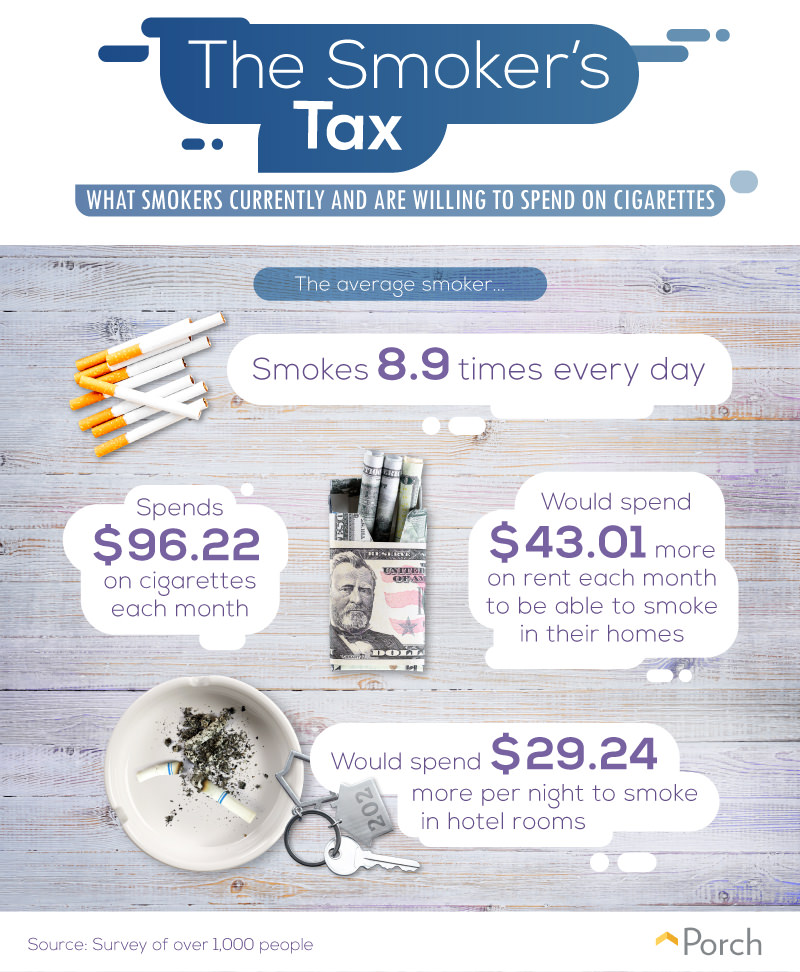 As a way to deter people from smoking, some states and regions have added taxes onto the already costly prices of cigarettes. While increases like the potential $2 tax in Washington, D.C., will make it one of the most expensive places in the country to buy cigarettes, it may not be enough to stop avid smokers. On average, the typical smoker has nearly nine cigarettes every day. While the price per pack can vary significantly from area to area, the cost of cigarettes adds up to more than $96 a month for smokers. That isn’t the extent of what they’d be willing to pay if it meant they could smoke more comfortably, though. Smokers were willing to spend over $29 more a night if it meant they could smoke in their hotel rooms and would pay an extra $43 on their monthly rent if they could smoke in their homes.
As a way to deter people from smoking, some states and regions have added taxes onto the already costly prices of cigarettes. While increases like the potential $2 tax in Washington, D.C., will make it one of the most expensive places in the country to buy cigarettes, it may not be enough to stop avid smokers. On average, the typical smoker has nearly nine cigarettes every day. While the price per pack can vary significantly from area to area, the cost of cigarettes adds up to more than $96 a month for smokers. That isn’t the extent of what they’d be willing to pay if it meant they could smoke more comfortably, though. Smokers were willing to spend over $29 more a night if it meant they could smoke in their hotel rooms and would pay an extra $43 on their monthly rent if they could smoke in their homes.
Crossing the line
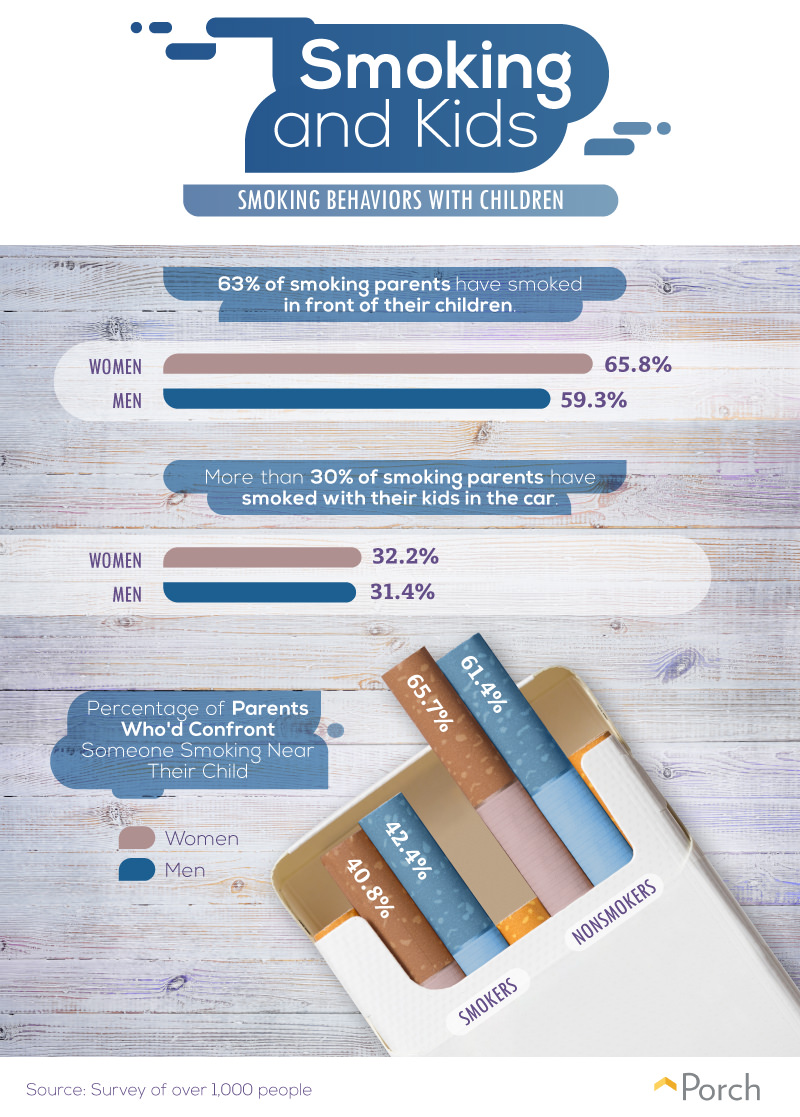 Whether it’s cigarettes, cannabis, or even a cigar, there’s more to consider than whether your children will contract the diseases often associated with secondhand smoke. While research shows kids exposed to smokers are more likely to contract heart and lung diseases, parents may want to be even more cognizant of the standard they’re setting when children see them with a cigarette or joint. Sixty-three percent of smoking parents admitted to smoking in front of their children. Another 30 percent (including 32 percent of women and 31 percent of men) said they smoked in the car with their children. Even with the windows rolled down, parents smoking in such a confined space with their children could be creating a hazardous environment. While smokers suggested they’d be less willing to speak up if someone else smoked around their children, a majority of nonsmokers wouldn’t accept that kind of behavior. Nearly 66 percent of women and 61 percent of men said they’d speak up if they spotted someone smoking around their children.
Whether it’s cigarettes, cannabis, or even a cigar, there’s more to consider than whether your children will contract the diseases often associated with secondhand smoke. While research shows kids exposed to smokers are more likely to contract heart and lung diseases, parents may want to be even more cognizant of the standard they’re setting when children see them with a cigarette or joint. Sixty-three percent of smoking parents admitted to smoking in front of their children. Another 30 percent (including 32 percent of women and 31 percent of men) said they smoked in the car with their children. Even with the windows rolled down, parents smoking in such a confined space with their children could be creating a hazardous environment. While smokers suggested they’d be less willing to speak up if someone else smoked around their children, a majority of nonsmokers wouldn’t accept that kind of behavior. Nearly 66 percent of women and 61 percent of men said they’d speak up if they spotted someone smoking around their children.
Hard dating decisions
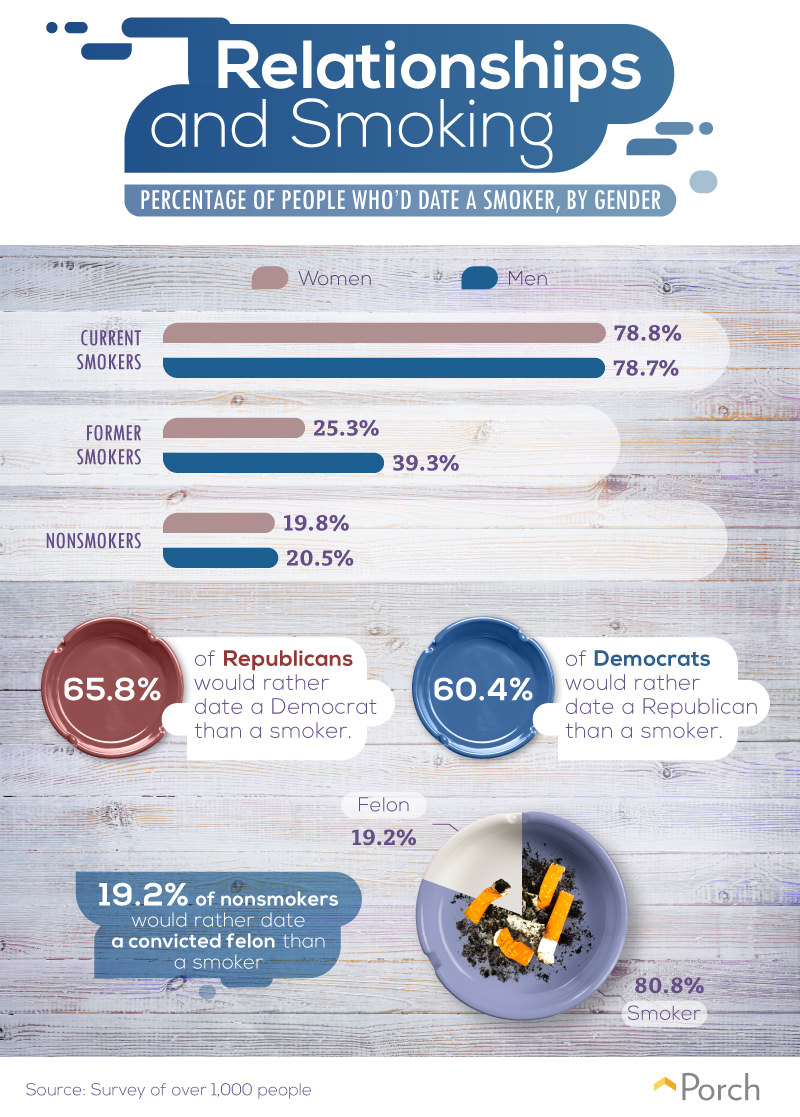 Even if you only consider yourself a “light smoker,” you might want to think about what smoking could be doing to your social life. Even current smokers wouldn’t unanimously date someone who likes to smoke. More than 1 in 5 current smokers admitted they didn’t want to date a fellow smoker, and more than 4 in 5 nonsmokers wouldn’t consider getting involved with someone who smoked. The tension between smokers and nonsmokers might be even more intense than the tension between Democrats and Republicans. While political stress in America escalates, nearly 66 percent of Republicans would rather date a Democrat than a smoker, and over 60 percent of Democrats would go out with a conservative in lieu of someone who lights up. If that weren’t telling enough, nearly 1 in 5 nonsmokers would rather date a convicted felon than someone who smokes.
Even if you only consider yourself a “light smoker,” you might want to think about what smoking could be doing to your social life. Even current smokers wouldn’t unanimously date someone who likes to smoke. More than 1 in 5 current smokers admitted they didn’t want to date a fellow smoker, and more than 4 in 5 nonsmokers wouldn’t consider getting involved with someone who smoked. The tension between smokers and nonsmokers might be even more intense than the tension between Democrats and Republicans. While political stress in America escalates, nearly 66 percent of Republicans would rather date a Democrat than a smoker, and over 60 percent of Democrats would go out with a conservative in lieu of someone who lights up. If that weren’t telling enough, nearly 1 in 5 nonsmokers would rather date a convicted felon than someone who smokes.
Better decisions for your health and home
The consequences of smoking are real and dangerous—but they go beyond physical health risks. Even smoking in social situations can expose you to hundreds of harmful chemicals that can linger on your clothes and in your home for years. As we found, the consequences of smoking could even cost you when it comes to selling your home or landing a date. Just like your personal health, we all want the best for our homes. That’s why Porch has your back, no matter what tasks are waiting for completion on your to-do list. By connecting you with home renovation experts in your area, there’s nothing you can’t accomplish with Porch on your side. Need something small like an appliance installation or something large like a window replacement? Visit Porch now to learn more.
Methodology
To compile the data used in this study, we surveyed 1,009 people about their smoking habits. The data consisted of 507 men, 490 women, and 12 who did not choose either gender. Of the 1,009 people, 658 were current smokers, 145 were former smokers, and 206 had never been smokers. Because the study relies on a survey, common drawbacks of surveys—such as relying on self-reported data—may be present. In all cases, we did our best to remain objective and present the data as collected, including self-reported data.
Sources
- https://www.cdc.gov/media/releases/2018/p0118-smoking-rates-declining.html
- https://www.reuters.com/article/us-health-cannabis/key-marijuana-drug-approval-looms-as-cannabis-goes-mainstream-idUSKBN1JH2H2
- https://www.mayoclinic.org/healthy-lifestyle/quit-smoking/expert-answers/cigar-smoking/faq-20057787
- https://www.mayoclinic.org/healthy-lifestyle/adult-health/expert-answers/third-hand-smoke/faq-20057791
- https://www.pbs.org/newshour/health/new-worry-smokers-families-thirdhand-smoke
- http://www.fox13news.com/news/local-news/smoke-free-apartments-popular-trend-in-housing
- https://www.washingtonpost.com/opinions/why-dcs-proposed-2-a-pack-increase-in-cigarette-taxes-is-wrong/2018/01/26/b6515c50-ffb7-11e7-8acf-ad2991367d9d_story.html?utm_term=.ffa2195bcf95
- https://www.healthychildren.org/English/health-issues/conditions/tobacco/Pages/Dangers-of-Secondhand-Smoke.aspx
- https://www.sheknows.com/parenting/articles/1138026/smoking-weed-in-front-of-kidshttps://www.webmd.com/smoking-cessation/features/can-you-get-away-with-social-smoking#1
Fair Use Statement
Want to share our findings and information on smoking? We encourage you to share anything on this page as long as it’s for noncommercial purposes. We ask only that you cite the authors and link back to this page when doing so.
